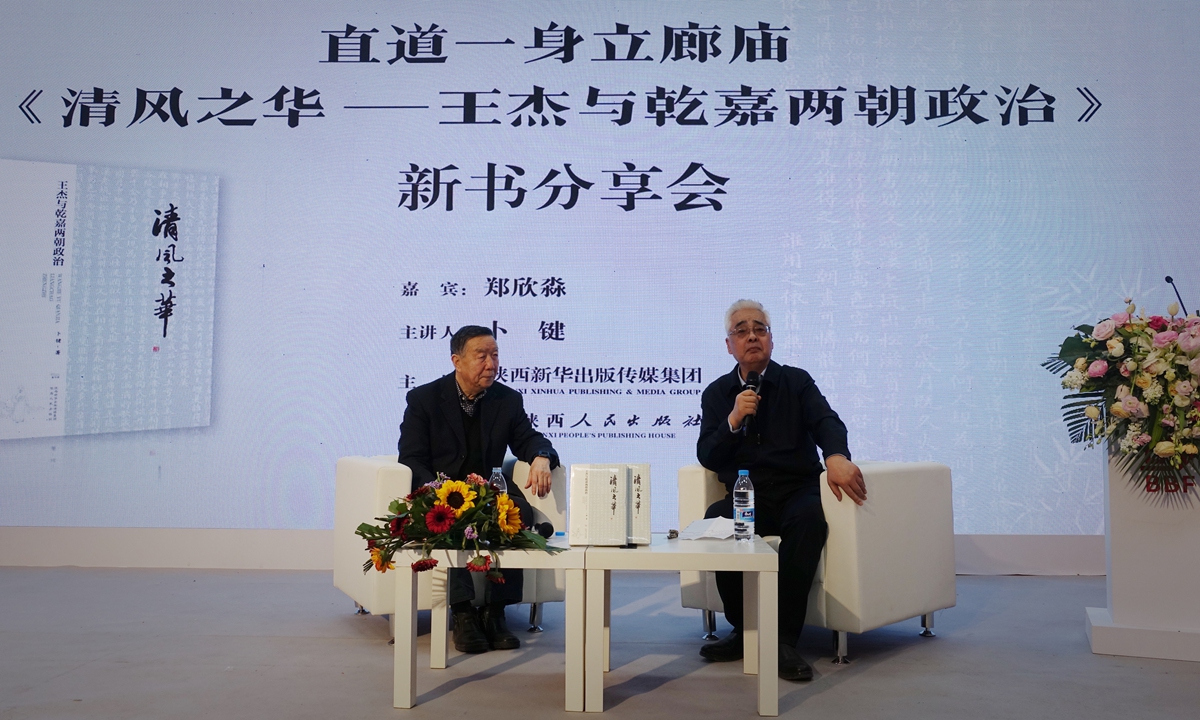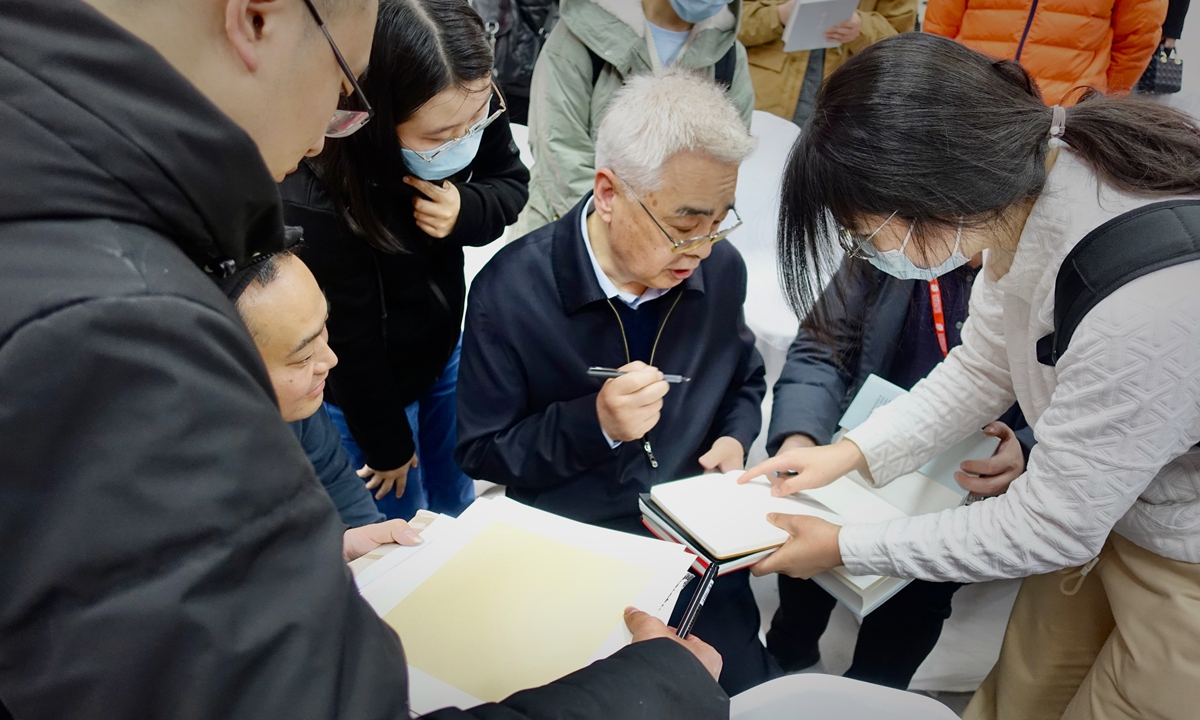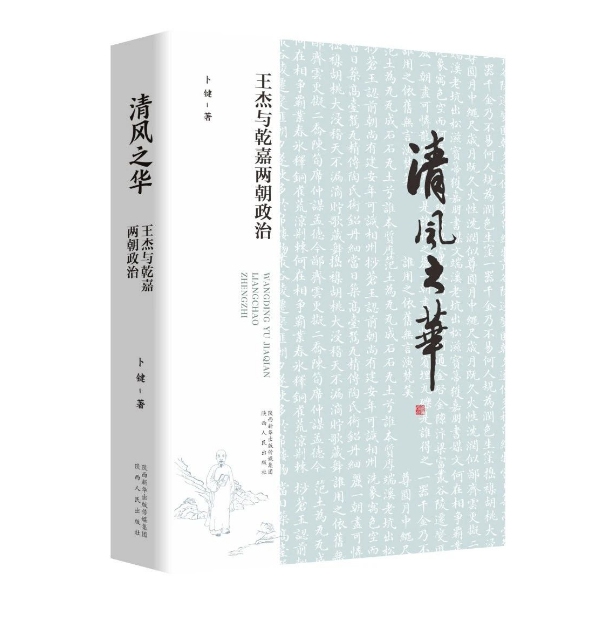ARTS / CULTURE & LEISURE
History a hit at Beijing Book Fair
Integrity of Qing Dynasty official impresses readers

Bu Jian (right) talks about the ideological connotation and creative process of his book at a book reading session. Photo: Lin Xiaoyi/GT
The China International Exhibition Center in Beijing was packed with visitors over the weekend. Returning from a hiatus caused by the pandemic, the 35th Beijing Book Fair attracted not only dealers and book store owners, but also large numbers of readers and book enthusiasts for the more than 400,000 kinds of books brought by 700 exhibitors to the venue.Among the many booths, a book reading session was surrounded by visitors listening to passages from Qingfeng Zhihua (lit: The shine of integrity) - Wang Jie and the Politics of the Qianlong-Jiaqing Period, a hefty history book about a Qing Dynasty (1644-1911) minister without much legend to his name.
"The power of admiration is infinite," the book's author Bu Jian, a renowned historian and former director of the National Codification Committee of Qing Dynasty History, told the Global Times during the reading session, emphasizing the admirable character of the official covered in his book.
Through eight years of researching numerous historical materials and making many field visits, Bu explored the life and career of Wang Jie, the first and only national champion in the Qing Dynasty imperial examinations from Northwest China's Shaanxi Province. Learning about the official's life, Bu was deeply touched by his integrity, honesty, and outstanding management abilities.
"I hope that more readers will understand this book's central figure, especially his righteousness as a minister 200 years ago and his adherence to China's splendid cultural traditions," Bu told the Global Times.

Readers flock to writer Bu Jian to get his autograph at the Beijing Book Fair on February 25, 2023. Photo: Lin Xiaoyi/GT
Wang served during the reigns of the Qianlong and Jiaqing emperors, one of the periods of dynastic history that people are most familiar with today. However, although Wang eventually rose to the rank of a grand secretary, he was not a figure who left a lasting mark on the pages of China's millennia-long history.So how did such a "boring" figure become so popular at the book fair?
It is customary to summarize important political figures in such definitive terms as "clean" or "corrupt," "capable" or "mediocre." However, while these terms are concise and evocative, they inevitably obscure the multifaceted character of people, Bu pointed out.
"Wang was unique in that he refused to become famous or someone who would have been labeled as such by posterity," he said.
Bu noted that in ancient China, the opportunity to make a name for oneself in history sometimes laid in self-promotion and the showmanship skills of officials.
"By contrast, Wang served as an academic administrator and had numerous students but never formed a clique to pursue his own selfish interests and was never keen on self-aggrandizement."
In the process of writing the book, Bu found that historical materials related to Wang did not involve personal matters, nor did his writings reveal his inner feelings.
Such a figure seems to be one whose name could be erased from history, but Bu intentionally chose Wang as an "entry point" to study the political landscape of the two emperors of the last prosperous era in the history of dynastic China, including employment, judicial and tax systems, and the means of social governance.
"Historical research in China emphasizes an approach in which we study a society by learning about a person from the era," Bu said.

Cover of Qingfeng Zhihua - Wang Jie and the Politics of the Qianlong-Jiaqing Period Photo: Courtesy of Shaanxi People's Publishing House
Instead of writing a dynastic history or adopting a semi-fictional biographical narrative to emphasize Wang's life, Qingfeng Zhihua is written with respect, adopting a multifaceted perspective to present the relationship between the central and local governments, the government and the people, the emperors and officials, and that among officials at that time. Readers are made to feel the empire's reverence for integrity and righteousness amid the afterglow of a prosperous dynasty.In the book, that great sense of integrity is captured through the countless details of Wang's life, such as how he remained in straitened circumstances even when he was in a high position because he refused to take bribes.
"Such a spirit is not only the doctrine of an official but also shows Wang's adherence to traditional morality and culture. It was a big part of the self-respect in his personality, and also widely resonates in history and contemporary times," Bu noted.
It is because of the book's emphasis on this spirit that it has gained the favor of many readers, especially young people. As soon as the reading session was over, many young readers flocked up to him to get his autograph.
Recently, history books continue to sell well in the domestic book market. Like Italian historian Benedetto Croce said, "All history is contemporary history." Readers look for resonance from distant antiquity. This may be one of the main reasons why good history books such as Qingfeng Zhihua are doing well in the market, industry watchers said.



